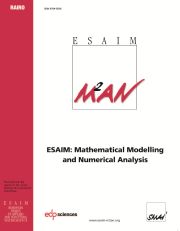Crossref Citations
This article has been cited by the following publications. This list is generated based on data provided by
Crossref.
Iliescu, Traian
and
Wang, Zhu
2014.
Are the Snapshot Difference Quotients Needed in the Proper Orthogonal Decomposition?.
SIAM Journal on Scientific Computing,
Vol. 36,
Issue. 3,
p.
A1221.
Amsallem, D.
and
Hetmaniuk, U.
2015.
A posteriori error estimators for linear reduced‐order models using Krylov‐based integrators.
International Journal for Numerical Methods in Engineering,
Vol. 102,
Issue. 5,
p.
1238.
Hoang, K.C.
Kerfriden, P.
and
Bordas, S.P.A.
2016.
A fast, certified and “tuning free” two-field reduced basis method for the metamodelling of affinely-parametrised elasticity problems.
Computer Methods in Applied Mechanics and Engineering,
Vol. 298,
Issue. ,
p.
121.
Zhu, Shengfeng
Dedè, Luca
and
Quarteroni, Alfio
2017.
Isogeometric analysis and proper orthogonal decomposition for the acoustic wave equation.
ESAIM: Mathematical Modelling and Numerical Analysis,
Vol. 51,
Issue. 4,
p.
1197.
van de Walle, A.
Naets, F.
Deckers, E.
and
Desmet, W.
2017.
Stability‐preserving model order reduction for time‐domain simulation of vibro‐acoustic FE models.
International Journal for Numerical Methods in Engineering,
Vol. 109,
Issue. 6,
p.
889.
Hoang, Khac Chi
Kim, Tae-Yeon
and
Song, Jeong-Hoon
2018.
Fast and accurate two-field reduced basis approximation for parametrized thermoelasticity problems.
Finite Elements in Analysis and Design,
Vol. 141,
Issue. ,
p.
96.
Li, Kun
Huang, Ting-Zhu
Li, Liang
and
Lanteri, Stéphane
2019.
POD-based model order reduction with an adaptive snapshot selection for a discontinuous Galerkin approximation of the time-domain Maxwell's equations.
Journal of Computational Physics,
Vol. 396,
Issue. ,
p.
106.
Shen, Jiguang
Singler, John R.
and
Zhang, Yangwen
2019.
HDG–POD reduced order model of the heat equation.
Journal of Computational and Applied Mathematics,
Vol. 362,
Issue. ,
p.
663.
Grunert, Dennis
Fehr, Jörg
and
Haasdonk, Bernard
2020.
Well‐scaled, a‐posteriori error estimation for model order reduction of large second‐order mechanical systems.
ZAMM - Journal of Applied Mathematics and Mechanics / Zeitschrift für Angewandte Mathematik und Mechanik,
Vol. 100,
Issue. 8,
Liljegren-Sailer, Björn
and
Marheineke, Nicole
2022.
Input-Tailored System-Theoretic Model Order Reduction for Quadratic-Bilinear Systems.
SIAM Journal on Matrix Analysis and Applications,
Vol. 43,
Issue. 1,
p.
1.
Stahl, Nadine
Liljegren-Sailer, Björn
and
Marheineke, Nicole
2022.
Certified Reduced Basis Method for the Damped Wave Equations on Networks.
IFAC-PapersOnLine,
Vol. 55,
Issue. 20,
p.
289.
Gong, Jiahao
Tang, Wenhu
Lan, Haijuan
Zhang, Zeyi
Xu, Xiongwen
and
Qian, Tong
2024.
A Novel Snapshot Selection Method for Proper Orthogonal Decomposition (POD) of Unsteady Heat Conduction Computation Using the Fourier Number.
p.
603.
Janes, Andrew
and
Singler, John R.
2025.
A new proper orthogonal decomposition method with second difference quotients for the wave equation.
Journal of Computational and Applied Mathematics,
Vol. 457,
Issue. ,
p.
116279.


